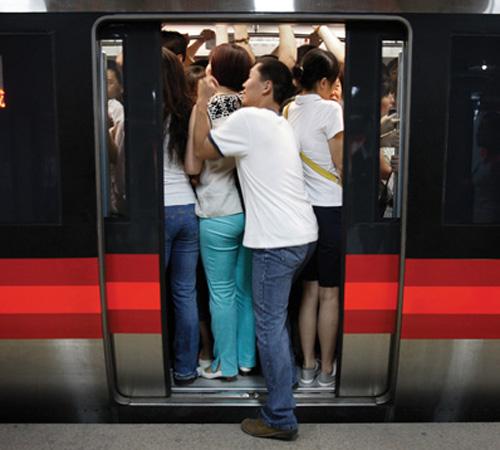Traffic restrictions take effect in Beijing

Commuters crowd a train at a subway station in Beijing on Monday. Many commuters switched to the subway on Monday, the first workday for restrictions on car use under a bold plan to clear the Olympic city of its notorious smog-choked skies. The Associated Press
Jul 22, 2008
Last updated on May 13, 2016 at 12:35 p.m.
BEIJING – Traffic flowed a little smoother. Busy avenues had fewer cars. By nightfall, even the hazy sky had mostly cleared.
So went the first workday under a government-imposed plan to reduce Beijing’s foul air pollution before the start of next month’s Olympics.
Millions of commuters turned to subways, buses and car pools as the strict program sought to take half of Beijing’s 3.3 million cars off the road.
In parts of the city, traffic was visibly lighter than on other workdays.
Get The Daily Illini in your inbox!
“There were much fewer vehicles on the airport expressway, and I could drive much faster,” said civil servant Lin Kai, shaving with an electric razor while sitting in his parked car.
He said he bought a new bicycle because of the restrictions and would try to pedal to work a few times a week despite the summer heat and the hour-long ride.
The two-month operation that began Sunday bans cars with odd-numbered license plates one day, even-numbered plates the next. The ambitious attempt to ensure “blue sky days” by the time 10,500 athletes and 500,000 visitors arrive for the Aug. 8-24 Olympics includes construction cutbacks and factory closures.
Those caught driving on days they should not will be fined $14, a stiff penalty even for Beijing. It wasn’t known how many tickets were issued; phones rang unanswered all day at the police traffic management bureau.
Sun Weide, spokesman for Beijing’s Olympic organizing committee, said the plan should reduce vehicle emissions by 63 percent. The emissions are a major cause of the thick, gray-brown haze that often hides the city’s skyline.
Changes in air quality will be monitored by experts from the city’s environmental protection bureau, which has 27 survey stations around Beijing and another 18 in Olympic venues, according to the state-run Beijing Times newspaper.
So far, “the air in the city is good, the density of pollutants has fallen,” the report said, citing the bureau. But it will take at least 20 days for results to be conclusive, deputy director Du Shaozhong was cited as saying.
Foreign experts said the plan could still go wrong because unpredictable winds might blow pollution from other provinces into Beijing, or a lack of wind – common in August – could allow local pollution to build up.
“For about 20 years, they have gotten rid of coal-burning in the city, but in the surrounding provinces, coal-burning has increased, so there are some things outside of the purview of the blue sky plan,” said Jennifer Turner, director of the China Environment Forum at the Woodrow Wilson Center in Washington. “There could be pollutants from outside the city blowing in.”
Turner said new subways and a rapid transit system may help reduce car use in the long term, along with the increase in gas prices.
“While the ban is a short term Band-Aid, it raises awareness,” she said. “The government has been pushing for cleaner autos and standards, and this is helpful for putting the issue front and center.”
On Monday, drivers with even-numbered plates were forced to find other ways to travel, and the government estimated that would mean an extra 4 million commuters.
Normally snarled traffic flowed smoothly in many areas, although a special “Olympic lane” on many busy thoroughfares meant one fewer lane for vehicles without a special pass. The Olympic lanes were empty Monday, still 18 days before the games begin, while adjacent lanes were jammed as usual.
“I don’





